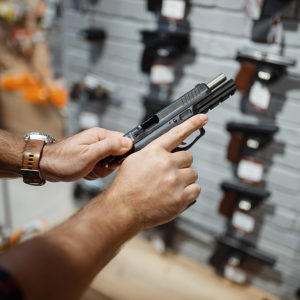While scrolling through the latest American gun tragedies, an email popped up that my car insurance was due for renewal.
My car insurance protects me against other people, but there’s also a liability aspect that protects other people against me. So, as our minds tend to work, I was rhetorically asking myself why aren’t gun owners required to have liability insurance.
The idea of requiring gun owners to carry liability insurance has been a topic of debate for years, given what seems to be a nonstop procession of American gun tragedies.
Proponents argue that it could incentivize safe practices and reduce incidents of gun violence. However, opponents claim that such a requirement would destroy the gun industry. So, what exactly are the potential implications of mandatory gun liability insurance and its effect on the gun industry? And can this idea help fix the gun violence problem in the United States?
One of the main arguments favoring mandatory liability insurance for gun owners is that it would create financial and legal incentives for responsible gun ownership.
If legislation requires gun owners to bear the financial burden of potential damages or injuries caused by their firearms, it is believed that they would be more likely to follow safe practices and take precautions to prevent accidents or misuse.
Another potential benefit of mandatory gun liability insurance is its potential to reduce gun violence. By raising the cost of gun ownership for individuals at higher risk of using firearms in crimes, insurance companies could deter these individuals from obtaining guns in the first place.
The financial incentive for gun owners to keep their weapons out of the hands of potential criminals could decrease gun-related crimes. However, it is essential to note that insurance alone cannot address the complex factors contributing to gun violence.
Implementing mandatory gun liability insurance is not without challenges and concerns. One primary concern is the potential infringement on the Second Amendment rights of gun owners.
Critics argue that requiring insurance could create financial barriers for law-abiding citizens to exercise their right to bear arms.
Of course, the nuts and bolts of determining premiums based on risk factors related to gun ownership are an educated guess at this point. The insurance industry would need to develop accurate and fair methods for assessing risk, which could be a pretty complex task.
Opponents of mandatory gun liability insurance argue that it would have a detrimental effect on the gun industry. They claim that insurance companies would refuse to provide coverage or set premiums at such high rates that gun ownership would become financially unfeasible for many individuals. This, in turn, could lead to a decline in gun sales and potentially harm businesses within the industry.
However, it is essential to note that the effect on the gun industry would depend on various factors, including the specifics of the insurance requirements and the response of insurance companies.
Ultimately, legislating that gun owners must carry liability insurance is a complex issue with potential benefits and challenges. While it could incentivize safe practices and potentially reduce gun violence, concerns about Second Amendment rights and the practicality of implementing such a requirement remain.
The effect on the gun industry would depend on various factors and require careful consideration.





